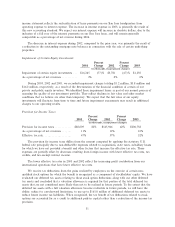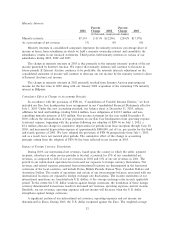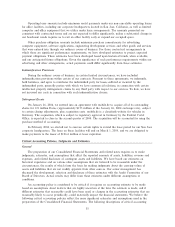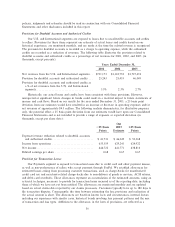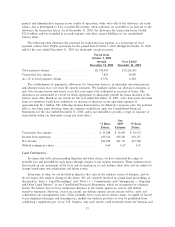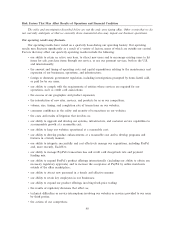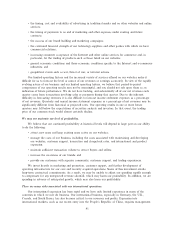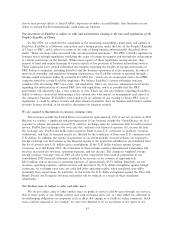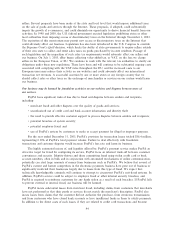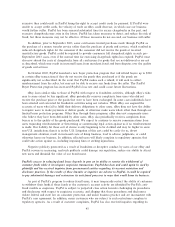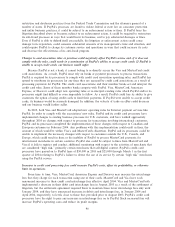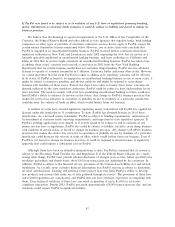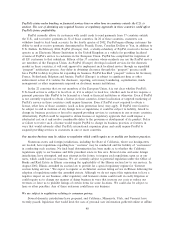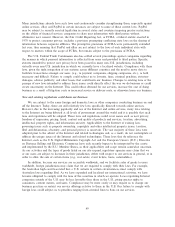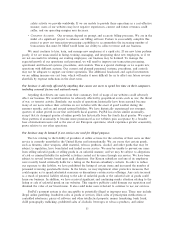eBay 2003 Annual Report Download - page 43
Download and view the complete annual report
Please find page 43 of the 2003 eBay annual report below. You can navigate through the pages in the report by either clicking on the pages listed below, or by using the keyword search tool below to find specific information within the annual report.‚ the timing, cost and availability of advertising in traditional media and on other websites and online
services;
‚ the timing of payments to us and of marketing and other expenses under existing and future
contracts;
‚ the success of our brand building and marketing campaigns;
‚ the continued Ñnancial strength of our technology suppliers and other parties with which we have
commercial relations;
‚ increasing consumer acceptance of the Internet and other online services for commerce and, in
particular, for the trading of products such as those listed on our websites;
‚ general economic conditions and those economic conditions speciÑc to the Internet and e-commerce
industries; and
‚ geopolitical events such as war, threat of war, or terrorist actions.
Our limited operating history and the increased variety of services oÅered on our websites make it
diÇcult for us to forecast the level or source of our revenues or earnings accurately. In view of the rapidly
evolving nature of our business and our limited operating history, we believe that period-to-period
comparisons of our operating results may not be meaningful, and you should not rely upon them as an
indication of future performance. We do not have backlog, and substantially all of our net revenues each
quarter come from transactions involving sales or payments during that quarter. Due to the inherent
diÇculty in forecasting revenues it is also diÇcult to forecast income statement expenses as a percentage
of net revenues. Quarterly and annual income statement expenses as a percentage of net revenues may be
signiÑcantly diÅerent from historical or projected rates. Our operating results in one or more future
quarters may fall below the expectations of securities analysts and investors. In that event, the trading
price of our common stock would almost certainly decline.
We may not maintain our level of proÑtability.
We believe that our continued proÑtability at historical levels will depend in large part on our ability
to do the following:
‚ attract new users and keep existing users active on our websites;
‚ manage the costs of our business, including the costs associated with maintaining and developing
our websites, customer support, transaction and chargeback rates, and international and product
expansion;
‚ maintain suÇcient transaction volume to attract buyers and sellers;
‚ increase the awareness of our brands; and
‚ provide our customers with superior community, customer support, and trading experiences.
We invest heavily in marketing and promotion, customer support, and further development of
operating infrastructure for our core and recently acquired operations. Some of this investment entails
long-term contractual commitments. As a result, we may be unable to adjust our spending rapidly enough
to compensate for any unexpected revenue shortfall, which may harm our proÑtability. In addition, we are
spending in advance of anticipated growth, which may also harm our proÑtability.
There are many risks associated with our international operations.
Our international expansion has been rapid and we have only limited experience in many of the
countries in which we now do business. Our international business, especially in Germany, the U.K.,
Canada, and South Korea, has also become critical to our revenues and proÑts. Expansion into
international markets, such as our recent entry into the People's Republic of China, requires management
41


